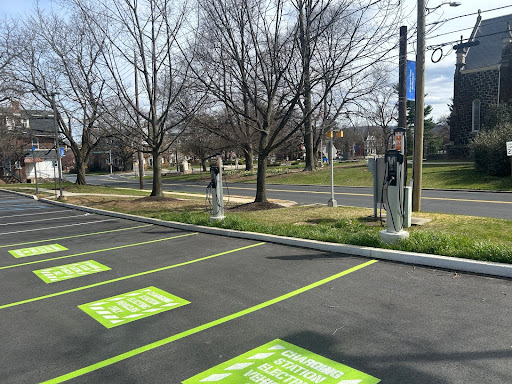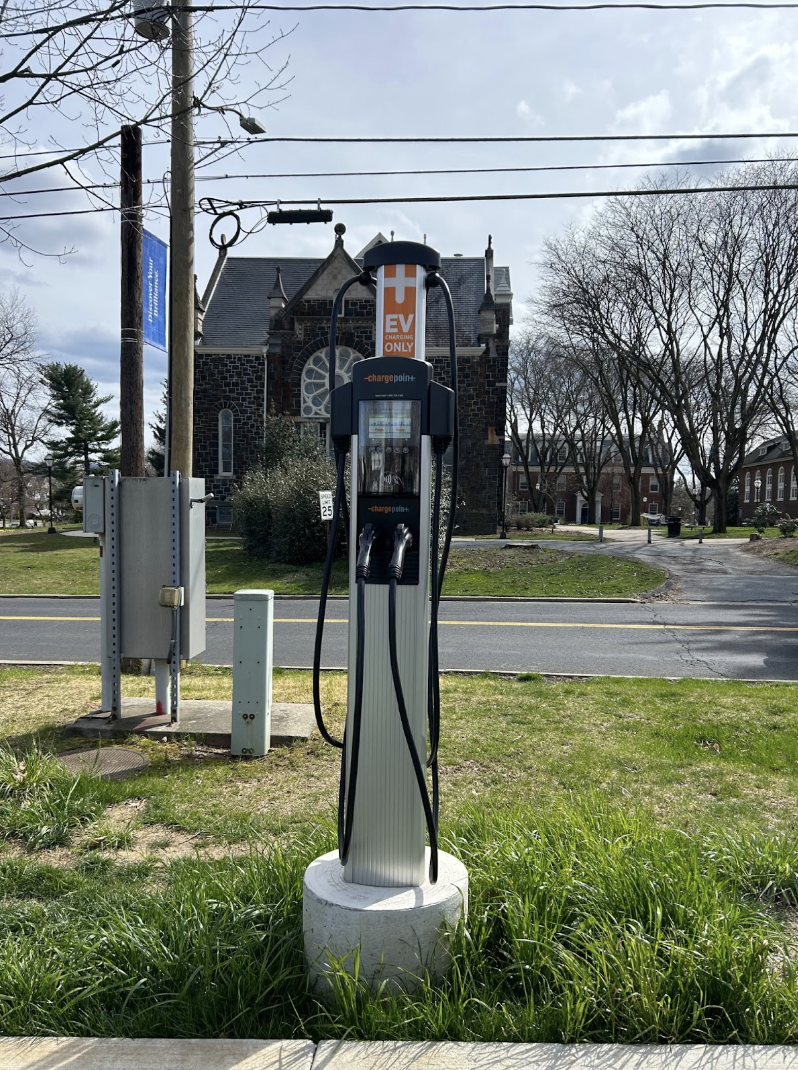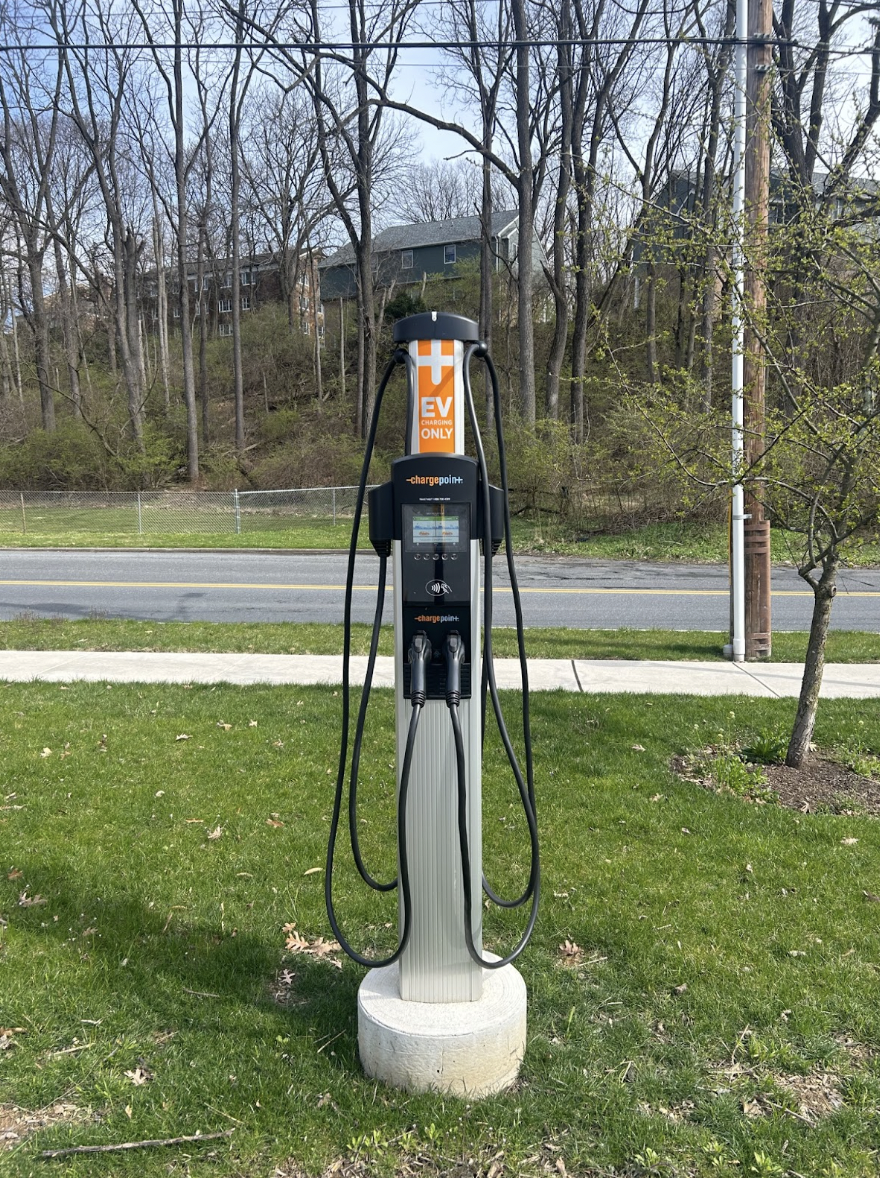
To support the growing number of faculty, staff, and students who drive electric vehicles (EVs) to campus, Moravian University installed three EV charging stations across a pair of locations on its Main Street campus in August of 2023. The stations were made operational the following month.
Two of the stations, which together provide four charging ports (two per station), are located near each other in Parking Lot A. The third station, which offers two additional charging ports, was installed in Parking Lot X. All stations are by parking spaces that have been painted green to indicate that they should be used only by EV drivers who are charging their vehicles.
The ports may be used by any member of the Moravian community who drives an electric vehicle and holds a faculty, staff, or student parking permit. The general public may use them, as well.
According to Chad Royer, former associate director of Utilities & Infrastructure in Moravian’s Office of Facilities Management, Planning, and Construction (FMPC), who oversaw the installation of the chargers, the idea to install EV charging infrastructure on campus came about following a series of requests made for such infrastructure by several Moravian faculty, staff, and students who had begun driving electric vehicles to campus in recent years.
Their requests were reflective of a growing trend in the national automotive industry, which shows that electric vehicles are gaining traction with American drivers. Last year, for example, over a million fully electric vehicles were sold in the United States alone, accounting for nearly 9% of all new vehicle registrations, an all-time high, according to S&P Global Mobility, an organization that follows the automotive industry. When it decided to address the requests of its own EV drivers last year, Moravian joined an increasing number of American institutions of higher education that have installed electric vehicle charging stations on their campuses; DeSales University and Lehigh University are among them.

Parking Lots A and X on the University’s North campus were found to be ideal locations for the chargers. “Lot A and Lot X were chosen specifically because of [how much they are used] – [Lot X] being a commuter lot, and Lot A being faculty, staff, and then open to students after 4:00 p.m.,” Royer said. “But the number one thing is that electrical infrastructure is within 10 feet of the [stations].” The Level 2 ChargePoint model CT4021 dual-port chargers that Moravian installed require significant power and need to be situated near electrical infrastructure, he added. Royer explained that not every parking lot on campus is situated near electrical infrastructure capable of supporting the power needs of these chargers like Lots A and X are.
To use these chargers, EV drivers must create an account with ChargePoint via the ChargePoint mobile app (available on the Apple App Store and Google Play). First-time users are prompted to answer questions about the make and model of their EV. The app uses this information to direct users to nearby ChargePoint stations with ports compatible with their vehicles. The stations on campus use the SAE J1772 adapter, the current North American standard for EV connectors, so compatibility should pose no issue for drivers. When a driver plugs their vehicle into a registered station that appears in-app, such as those on campus, the app then sends them push notifications to alert them when their vehicle is done charging.
EV drivers also need to provide the app with a payment method: the stations on campus are not free to use. All users are billed through the app at a flat rate of $0.25 per kilowatt-hour while their vehicles charge on campus. This is the same rate that EV drivers are charged to use nearby local ChargePoint stations owned by the Bethlehem Parking Authority.
Though EV drivers must pay to use the stations on campus, Royer said that they were, “not installed as a revenue generator. They are an investment in our community.”
Between the price to purchase EV charging stations, install the stations on campus (though an internal institutional initiative, installation work was done externally by Albarell Electric of Bethlehem), and repaint parking spaces in Lots A and X, the total estimated cost of this project was $65,000. Royer was able to reduce that amount by $21,000, though (instead making the total estimated cost of the project $44,000), with a Driving PA Forward rebate from the Pennsylvania Department of Environmental Protection.
Many EV-owning members of the Moravian community have welcomed the installation of the charging stations.
“It was a significant factor in my enthusiasm regarding acquiring an electric vehicle – security in knowing that I could charge it at my workplace,” said Dr. Louise Keegan, associate professor of speech-language pathology and associate dean of the School of Rehabilitation Sciences. “When I might have a longer trip (eg., leave after a workday to drive to a conference), it will be super convenient to be able to charge on campus and leave work with a fully charged vehicle.”

Dr. Virginia Adams O’Connell, associate professor and chair in the Department of Sociology and Anthropology, similarly emphasized the significance and convenience of having EV chargers located directly on campus. “More people will be getting electric vehicles in the next decade,” she said. “I think having the chargers is very important, even if you just consider the needs of people visiting the campus.”
Commuter student Ryan Younes ‘25, however, expressed reservations about the timing of Moravian’s installation of charging infrastructure on campus. “Starting in 2025, the majority of companies that are producing EVs will be converting their charge ports to Tesla’s NACS port [SAE J3400],” he said. “So in about a year or two, no new EVs will be compatible with our charging stations, which in my mind, significantly devalues our charging stations.”







